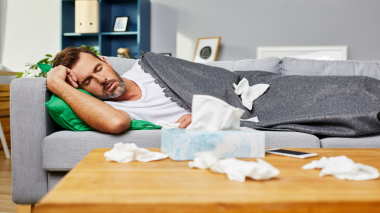Visit your favorite restaurant or grocery store and you’ll likely see options for mocktails, “zero-proof” drinks and non-alcoholic wine, beer and spirits. You may even notice alcohol-free bars pop up in your area.
There’s a rising trend of going alcohol-free or being “sober-curious.” A 2024 survey by NCSolutions found that 41% of American adults plan to drink less in 2024. This is particularly true for younger adults: 49% of millennials and 61% of Generation Z respondents said they wanted to drink less this year, with their mental health as a top reason for skipping adult beverages.
“Alcohol affects the body in many ways, with both short-term and long-term side effects,” says Dr. Bradley Horne, a family medicine physician at Atrium Health Primary Care Virtual Family Medicine. “I’m definitely seeing a trend of people cutting back on alcohol.”
Horne shares the mental and physical benefits of nixing adult beverages from your life, plus signs you should cut back.
How does alcohol affect the body?
The short-term side effects of alcohol use include:
- Speech and motor impairments
- Increased risk of injuries or accidents
- Increased risk of risky behaviors
- Increased risk of alcohol poisoning, which can be fatal
- Poor sleep
- Confusion
- Nausea
- Vomiting
- Diarrhea
- Headache
- Dry eyes and mouth
- Loss of consciousness
- Drowsiness
- Memory issues
- Difficulty concentrating
- Breathing problems
A common misconception is that drinking alcohol will help you sleep better, but that couldn’t be further from the truth.
“Alcohol may make you feel tired initially, but you won’t get a restful night’s sleep because it affects your sleep cycles,” Horne explains.
Alcohol use can also impact your mental health.
“You may initially get positive feelings from drinking because your brain will release feel-good hormones called endorphins,” Horne says. “But drinking can make mental health issues like anxiety and depression worse. Alcohol is a depressant, so your lows will seem lower when you drink. Alcohol may temporarily numb your pain, but it will often make it worse over time.”
Long-term, consistent alcohol consumption can lead to:
- Increased risk of head, neck, esophageal, liver, colorectal and breast cancer
- Increased stroke risk
- Higher risk of Alzheimer’s disease and dementia
- Cardiomyopathy (enlarged heart)
- Liver cirrhosis
- Fatty liver disease
- Pancreatitis
- High blood pressure
- Mood changes, like anxiety, depression and mood swings
- Relationship issues
- Poor performance at school or work
- Alcohol use disorders
- Weakened immune system
“Alcohol affects every organ system in the body,” Horne says. “It affects the brain and your brain coordinates every part of your body. If your brain isn’t functioning properly, nothing else will either.”
The health benefits of going alcohol-free
If you choose to eliminate alcohol from your life, you can experience health benefits like:
- Weight loss
- Liver damage repair
- Better immune system function
- Better blood sugar regulation
- Higher-quality sleep
- Better mood, including less anxiety and stress
- Increased energy
- Healthier relationships
- Better brain function, memory and cognition
- Reduced risk of heart disease, stroke and multiple forms of cancer
Signs to consider eliminating alcohol from your life
There are many different reasons to cut back on alcohol, Horne says, including:
- Physical health issues, like the symptoms and risk factors mentioned above
- Mood changes, like increased anxiety and depression
- Relationship issues
- Poor performance at work or school
- Preoccupation with drinking, such as counting the hours until you can have your next drink
- Financial troubles from spending excess money on alcohol
- Legal issues, such as receiving a citation for driving while intoxicated
- Frequent binge drinking (more than three drinks on one occasion for women and more than four drinks per occasion for men)
- An interest in improving your overall health and wellness
Horne says some people shouldn’t consume alcohol at all. You shouldn’t drink if you:
- Are under the age of 21
- Are pregnant or planning to become pregnant
- Have a personal or family history of alcohol abuse or addiction
- Have hepatitis
- Have liver disease
- Are planning to drive or operate heavy machinery
- Are on medications that can interact with alcohol
How to cut back on alcohol
No matter your reason for cutting back on or eliminating alcohol, there are several ways to make the transition easier:
- Try mocktails or alcohol-free wine, beer or spirits.
- Order club soda with lime at restaurants, bars or social events.
- Unwind with healthy practices like stretching, exercise, journaling, prayer, meditation, breathwork and time in nature.
- Spend more time with family and friends.
- Add more hobbies to your life, such as cooking, yoga, watching movies, working on cars, hiking, drawing, knitting, reading, yard work or sports.
- Don’t buy alcohol or keep it in your house.
- Let your friends know you’re cutting out alcohol; consider finding new sources of support if your social circle drinks heavily.
“If you’re concerned about your alcohol use, talk to your primary care provider or a therapist or seek out an Alcoholics Anonymous meeting,” Horne says. “They can point you toward resources that can help.”
If you have questions or concerns about your alcohol use, talk to your primary care provider. Find an Atrium Health primary care provider near you. Find care now.



